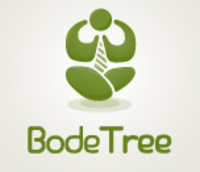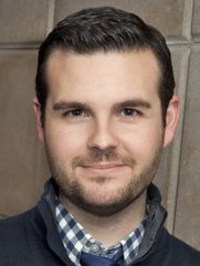Thursday, May 22, 2014
BodeTree: Bringing Strategy And Analytics To Main Street Business

As a high priced consultant, Chris Myers, founder of Denver-based BodeTree (www.bodetree.com), got to see how he could optimize multimillion dollar, Fortune 500 businesses, and saw the kind of firepower and resources they were able to command from consulting and strategy firms. However, as he began working with small and medium sized businesses, he realized that those businesses just didn't have access to those same resources. The answer? His startup, BodeTree, which is trying to take what he learned in the consulting business, and apply that with software--in an automated way--to helping those small business customers translate their finances into strategy and growth. We caught up with Chris after they just announced a $2M funding from Greenline Ventures and others.
What is BodeTree?

Chris Myers: BodeTree is really the central home base for small business owners online. We take all of the data that they have locked up in things like Quickbooks and Xero accounting software, and translate that into plain English for a typical business owner. For anybody who is not financially savvy, we help translate those finances into plain English, so they can make better decisions, and so small business owners can understand where they've been, where they are today, and where they want to go in the future.
What's your background and how did you get into this?
Chris Myers: My background is actually in finance and strategy. I started out as a consultant, doing mid-market investment banking, valuation, and M&A type work. I graduated from there to the strategy world, and was part of the strategy team at the Apollo Group, which owns the University of Phoenix and other educational services. That's where I met my co-founder, Matt, who was head of strategy at Apollo. That's where I came up with the concept of BodeTree. I had worked with lots of small and medium sized businesses, and saw their pain points. At Apollo, I both saw the many resources and services available to larger companies, such as consultants, to help them tackle their hairy challenges. However, I saw those resources were completely out of reach to small businesses, who are 97 percent of all companies in this country. We set out to find a way to bring those same kinds of insights that Fortune 500 companies get, to the five million companies on main street.
Why do SMBs they need your services, and why would they be compelled to use your product?
Chris Myers: Great question. When you think about the ecosystem for small business owners today, at one of the spectrum, they have things like accounting tools. Those are effectively mandated by law, because they have to be able to pay their taxes and create financial reports. That's what Quickbooks and others are really focused on. The problem is that accounting is very technical and challenging, and only helps businesses understand what has happened in the past. If you move along the spectrum, you run into things like capital, or the need for small businesses to raise capital and to make decisions and to grow their business. However, there really isn't a service or product that fits in the middle, that bridges those insights available from the financial data with tangible needs of the business. They need capital, and the need to make decisions. BodeTree really helps them do that. It helps to put business owners in control, helps them understand their finances and take action, and see the secrets hidden in their financials. Business owners who need BodeTree are the ones who want to make better decisions, grow their business, and access capital. We really serve as a virtual CFO or advisor, to help them clear the path to take action going forward.
Quickbooks is pretty dominant in the market for small businesses--with what must be 95 percent of the market. How do you connect with what they are doing?
Chris Myers: Yes, it's 97 percent market share for Quickbooks and Quickbooks Online. We're a trusted Intuit partner, which means we went through their validation process and application process to become a partner. The short version, is there is an API that Intuit opens up to select partners--we're one of them--which lets us sync all of the historical financial data that lives in their system. We pull that data in, and then we go to work like and advisor or consultant. We do the math, do calculations, help businesses understand how much they are worth, and compare them to their competition. The sync process is as simple as entering Quickbooks and Xero credentials, and it takes only two or three minutes--depending on how much data you have--to sync, then it's always connected.
Can you give an example of the insights people can gain from the software?
Chris Myers: I actually do a TV show with MSNBC, Your Business. We do business makeovers and we feature interesting small business. On one of them, on the most recent episode which aired on Sunday, was a jewelry store in Monterey, California. They basically had four stores in a single building, one selling silver, another pearls, another fashion jewelry, and a clearance store. The business owner's son wrote into the TV show for help, because his father was 65 and wanted to start to retire. He had no idea of how to plan for the future or optimize the business, so that he could get an eventual exit and end up selling it or passing it on to the next generation. So, we went in and sync'd the data, so that they could get their arms around where the business had been, where it stands relative to the competition, and used that information to create a path going forward. The takeaway was, the company was profitable and making money, however, how it was structured was such that their inventory costs were completely out of control, and their overhead was out of control. We learned that if we could simply consolidate those four stores into one business, they could do better job of tracking inventory, ordering at the right time, and turn the highest selling inventory a copy of times faster. With that, they could add almost a half million in value to the business in short order. We brought in retail experts using that roadmap, consolidated the stores, and got them moving forward to dramatically improve the profitability of the business so they could start marketing it to buyers.
What's the biggest thing you've learned as an entrepreneur at a startup?
Chris Myers: My background has always been as a thinker. I've been a consultant, a strategy person. When you do that, you have the luxury of noodling on a given problem, and presenting your findings--here's the answer, and walking away and moving on tot he next thing. Being entrepreneurial and operational has been a very interesting learning experience. You personally grow to appreciate the intricacies of executing against very complex and long running plans. It's also been educational learning how to phrase, and market, and message about a given product, and figure out how to motivate a team. Going operational has been a fascinating journey for me, coming from the finance and strategy world.
Thanks, and good luck!